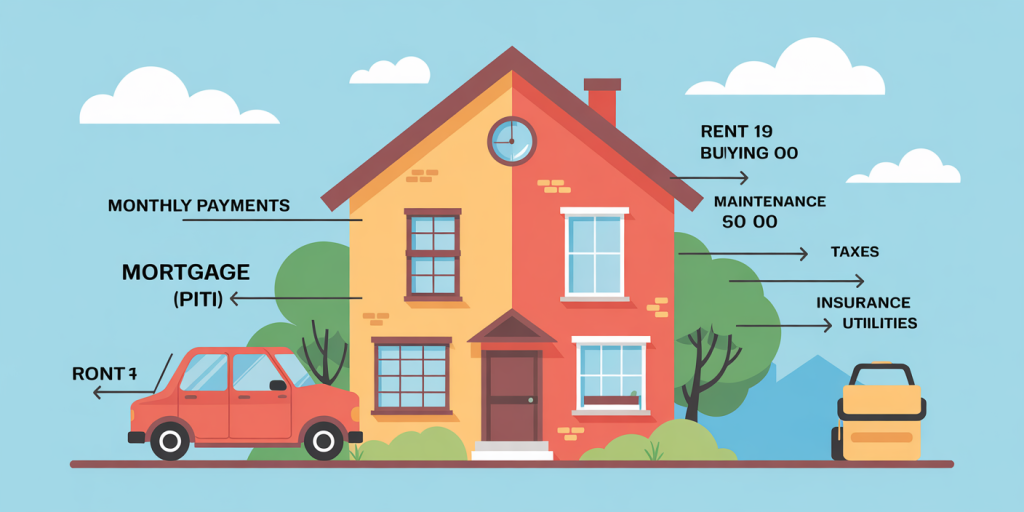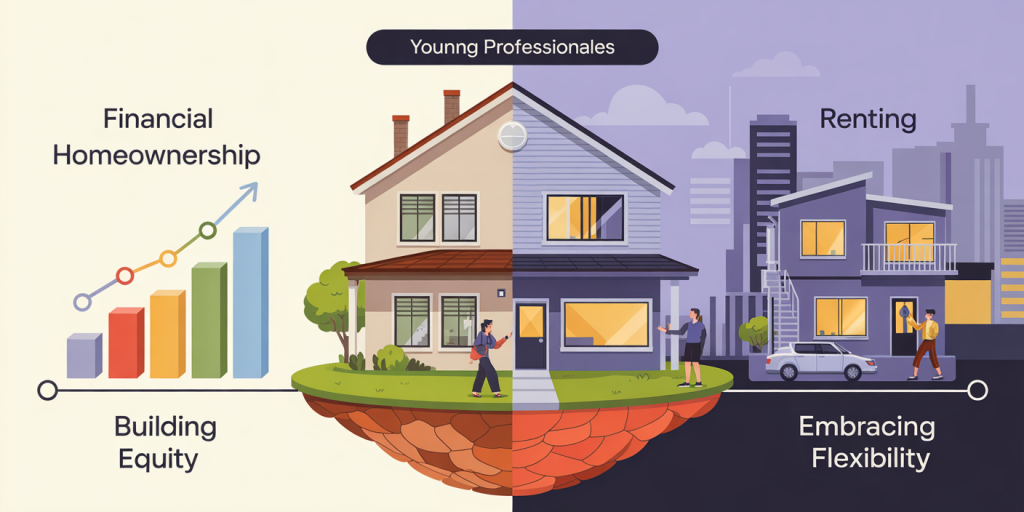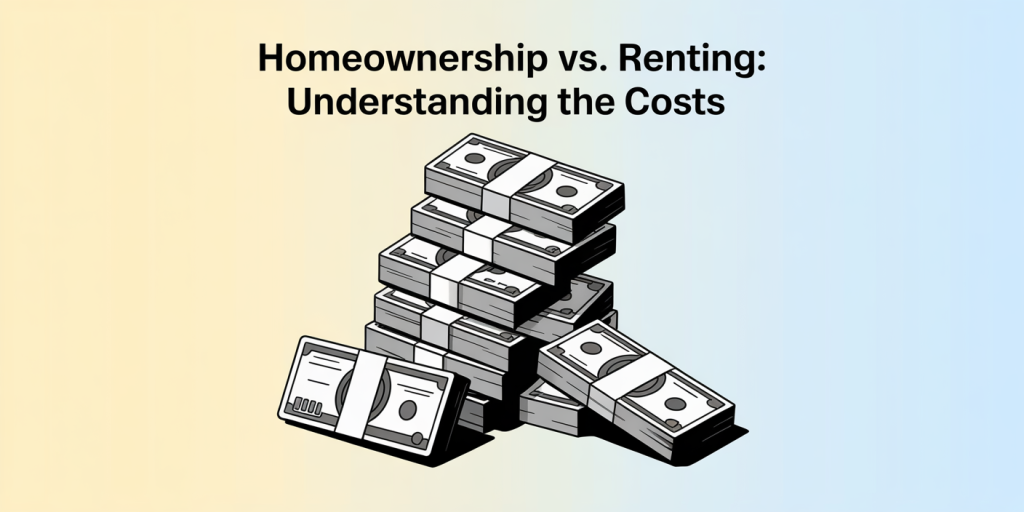Should You Rent or Buy? A Financial Breakdown
Deciding whether to rent or buy a home is one of the most significant financial decisions many individuals face. This choice affects not only your monthly expenses but also your long-term wealth-building strategies, lifestyle flexibility, and financial security. With fluctuating housing markets, diverse financial situations, and evolving demographic trends, determining the best path requires a thorough understanding of both options’ costs and benefits.
Worldwide, homeownership rates vary, but in the United States, for example, the U.S. Census Bureau reported a homeownership rate of approximately 65% in 2023. Despite this, a growing number of people opt to rent, especially younger adults in urban areas where rising home prices and student loan debt make homeownership challenging. This article offers a financial breakdown to help you evaluate whether renting or buying a home is the right choice based on economic factors, personal circumstances, and market conditions.
Comparing Monthly Costs: Rent vs. Mortgage
One of the first factors most people consider is the monthly cost associated with renting compared to owning a property. A rent payment is often perceived as “throwing money away,” whereas mortgage payments contribute to building equity. However, the reality is more nuanced and depends substantially on market conditions.
For example, in 2023, the median rent for a one-bedroom apartment in major U.S. cities ranged from $1,200 to over $3,000 per month, depending on the location. Meanwhile, the median monthly mortgage payment, including principal, interest, taxes, and insurance (PITI), was about $1,500 to $2,500 for a median-priced home. The higher upfront costs of buying—down payment, closing costs, and maintenance—can make ownership appear costlier initially. Still, over time, mortgage payments contribute to an asset, which can appreciate in value.

Consider the following table, showcasing the estimated monthly costs in a representative city:
| Expense Category | Renting (1BR Apartment) | Buying (Median Home) |
|---|---|---|
| Monthly Payment | $1,800 | $2,200 (PITI) |
| Maintenance & Repairs | N/A | $300 |
| Property Taxes | N/A | $200 |
| Homeowners Insurance | N/A | $100 |
| Utilities | Usually Included | Extra $150 |
| Total Estimated Monthly Cost | $1,800 | $2,950 |
This comparison shows that monthly homeownership carries additional financial responsibilities beyond the mortgage. Renters, in contrast, often have fewer unexpected expenses but do not build equity from payments.

Building Equity vs. Flexibility
A major financial advantage of buying a home is building equity. Equity represents the portion of the property you actually own — as you pay down your mortgage, your equity grows. Additionally, the property itself may appreciate over time. According to the National Association of Realtors, U.S. home prices appreciated by an average of 5% per year in the decade leading up to 2023, which can significantly boost your net worth.
For example, if a home is purchased for $300,000 and appreciates at 5% annually, after five years, its value would rise to approximately $382,884. Meanwhile, the owner would have been paying down their mortgage principal, further increasing equity. This combination of market appreciation and debt reduction can make buying an excellent long-term investment.
On the other hand, renting offers flexibility often appealing to younger or more mobile individuals. Renters can relocate with comparatively little friction when job opportunities change or personal circumstances evolve. Homeowners selling property often face longer timelines and costs, such as real estate agent fees and capital gains tax implications.
A real-life example is Sarah, a 28-year-old tech worker who rented in San Francisco for five years while building her career. Eventually, she decided the appreciation and investment prospects favored purchasing a condo. Conversely, Tom, a freelance consultant, found renting better suited due to frequent relocations every few years for client engagements, avoiding the financial risks of forced sales or carrying costs.
Upfront Costs and Financial Barriers
Another critical consideration in the rent vs. buy debate is the initial financial barrier. Buying a home requires a significant upfront investment: down payment, closing costs, inspection fees, and sometimes renovation expenses. The down payment typically ranges from 3% with some loan programs to 20% or more for conventional mortgages.
For instance, purchasing a $350,000 home with a 20% down payment requires $70,000 upfront, not including closing costs that can add another 2-5% of the purchase price. Additionally, buyers must have reserves for moving, furnishing, and unexpected repairs.
Renting usually demands a security deposit equal to one or two months’ rent and possibly first and last month’s rent upfront, totaling a much smaller financial obligation initially. This lower barrier to entry makes renting attractive to many young adults or those with limited savings.

Data from the Urban Institute indicates that the average renter’s security deposit is around $1,200, whereas a median homebuyer often needs tens of thousands in initial capital. Such disparity can delay homeownership, especially for lower-income households.
Tax Implications: Homeownership Benefits
Tax considerations can tip the scales for buying in some cases. Homeowners often benefit from mortgage interest deductions, property tax deductions, and potential capital gains exclusions when selling their primary residence.
For example, if a homeowner pays $10,000 in mortgage interest and $5,000 in property taxes, they might deduct these from their taxable income (subject to IRS limits). This can reduce their federal tax liability substantially. Before 2018, these deductions were even more lucrative, but the Tax Cuts and Jobs Act capped state and local tax deductions at $10,000, affecting some high-tax areas.
Renters do not enjoy these tax benefits but can deduct rental expenses in rare cases if renting part of their home for business purposes.
However, tax advantages should not be the sole reason to buy, as they depend on individual tax situations. Financial advisors recommend running the numbers with a tax professional before relying on these perks.
Market Risks and Investment Perspective
Buying a home is also an investment exposed to market risks. While historical data indicates overall home price appreciation, certain regions and periods experience price declines or stagnation. For example, the 2008 housing crisis wiped out significant equity for many homeowners, leading to foreclosures and financial hardship.
A case in point is Detroit, which suffered decades of real estate value decline due to economic downturns, resulting in homeowners losing substantial equity. Similarly, urban centers with rapidly rising prices can become unaffordable, and bubble risks may present.
Renting removes direct exposure to property value fluctuations but means missing out on potential returns from owning real estate.
Financial experts often recommend that buying makes more sense if you plan to stay in a home for at least five to seven years, allowing appreciation, mortgage amortization, and transaction cost amortization to offset the upfront expenses.
Lifestyle and Long-Term Financial Planning
Beyond numbers, lifestyle preferences play a vital role. Homeownership offers stability, personalization, and the ability to build wealth, but requires maintenance responsibilities and less geographic mobility. Renters gain flexibility and fewer commitments but may face rent increases and no equity accrual.
For couples starting families, buying often aligns with creating stable, long-term home environments and benefiting from schools and neighborhoods. Young professionals or students might prioritize renting to accommodate uncertain plans.
Financial planners advocate integrating rent vs. buy decisions into broader goals such as retirement planning, emergency funds, and debt management.
Future Perspectives: Evolving Housing Trends and Financial Technologies
Housing markets and financial products continue to evolve, impacting the rent vs. buy dynamics. Technology platforms increasingly offer fractional homeownership, helping buyers pool resources to enter the market. Rent-to-own arrangements allow renters pathways to buying with portioned payments.
Additionally, remote work is reshaping housing demands; more people consider buying in affordable suburban or rural areas, sometimes increasing demand and prices there.
Sustainability trends promote green building and retrofitting homes, which might increase ownership costs but offer long-term savings.
Macro-economic conditions like mortgage rates heavily influence affordability. As of mid-2024, mortgage rates have fluctuated between 6% and 7%, higher than historic lows seen in the early 2020s, thereby increasing borrowing costs and affecting buying appeal.
In urban policy, governments are considering incentives for affordable homeownership and rent control to balance housing accessibility.
The interplay between evolving economic factors and personal financial strategies suggests that rent vs. buy decisions will remain complex and deeply individualized for the foreseeable future.
Deciding whether to rent or buy demands a comprehensive evaluation of monthly costs, equity building, upfront barriers, tax implications, market risks, and lifestyle preferences. While buying a home can be a lucrative long-term investment and source of personal satisfaction, renting provides flexibility and lower initial financial hurdles. Analyzing your financial situation, local market conditions, and future plans is essential to making the choice that aligns best with your goals and resources.
